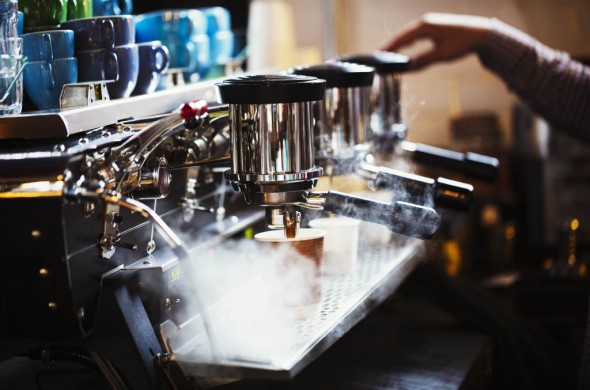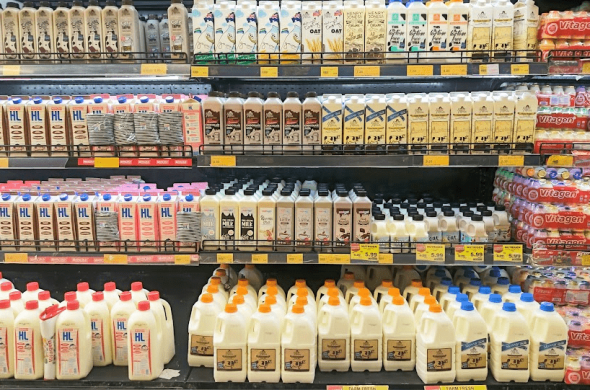The food and beverage industry in the Middle East and Africa is experiencing remarkable growth. For instance, in the UAE, revenue in the food market is projected to reach US $40 Bln in 2024, with a compound annual growth rate (CAGR) of 4.9% from 2024 to 2028. Factors like rising disposable incomes, a growing affluent population, and a booming tourism sector are fueling this surge.
As the region's market expands, several key trends are emerging. For instance, health-conscious consumers are driving demand for organic and nutritious options. Sustainability is becoming a priority, with businesses seeking eco-friendly practices to meet consumer expectations.
As the market evolves, understanding these trends is essential for businesses aiming to thrive. Food and beverage consulting firms make it easier to navigate these changes, offering insights and strategies to stay competitive. Read on to discover the top trends shaping the food and beverage industry in 2024.
Embracing Zero-Sugar Beverages
As health awareness grows, the demand for sugary beverages is rapidly declining. Many consumers are now opting for zero-sugar or low-sugar alternatives to traditional sugary drinks, which have long been linked to obesity and other health issues. In line with these trends, governments across various regions are imposing taxes on sugar-sweetened beverages.
For instance, 78.7% of countries in the African Region have implemented excise taxes on these drinks. In response, beverage brands are ramping up the production of zero-sugar and low-sugar alternatives.
Beverage manufacturers are tasked with a dual role. They must innovate healthier drink options and enhance their marketing efforts to promote these alternatives, steering consumers away from sugar-heavy drinks. This trend is setting the stage for a healthier future in the beverage industry, with a clear move towards zero-sugar options.
High Preference for Premium Drink Choices
As consumers trend towards drinking less alcohol, their preferences lean distinctly towards higher-quality, premium beverages. There's a growing enthusiasm for experimenting with unique offerings. For instance, consumers are experimenting with craft beers and specialty spirits in settings like bars and restaurants.
Well-established brands continue to dominate casual drinking occasions due to their recognized quality and familiar taste. This evolving consumer landscape presents a significant challenge for major beverage companies: conveying the value of premium products to a younger audience that values quality over quantity.
To effectively engage these consumers, beverage brands are turning to influencer marketing. Additionally, innovations such as collaborating with mixologists or integrating trending ingredients, like superfoods, to refresh offerings and captivate the market are crucial.
Benefit-Boosted Beverages Gaining Market Dominance
The beverage industry landscape is transforming as consumers increasingly seek drinks that offer more than just refreshment. In 2024, functional drinks, especially nutraceutical beverages, are gaining prominence. These products not only satisfy thirst but also provide significant health benefits, making them highly attractive in a health-conscious market.
Functional drinks are categorized into naturally beneficial beverages like green tea, enhanced options such as lattes with lion’s mane mushrooms for improved focus, and purpose-designed choices like magnesium-enriched mocktails to aid sleep. This variety meets a range of consumer needs, from everyday wellness to specific health outcomes.
However, marketing these products demands precision to avoid consumer skepticism. Claims about health benefits must be solidly backed by scientific evidence. Staying attuned to consumer preferences and trending ingredients through active social media engagement is essential for brands to remain relevant and successful in this segment.
Sustainability Is Driving New Packaging Initiatives
As single-use plastic legislation tightens globally, the food and beverage industry is pivoting towards sustainability loyalty programs, such as deposit return schemes (DRS). These initiatives encourage consumers to engage in recycling practices by offering a refund for returning single-use containers to designated reverse vending machines.
In regions like Abu Dhabi and Dubai, companies are spearheading these schemes with apps, which streamline the recycling process. This app-based solution allows individuals and businesses to schedule recyclable pickups and earn rewards based on the weight of their contributions.
For beverage companies, adapting to these changes means either taking preemptive steps to reduce single-use plastics or embracing DRS-compliant packaging. Proactive adaptation can include innovations like Coca-Cola's new single-action caps.
The caps are designed to stay attached to bottles to ease recycling processes and reduce litter. These strategies are vital as they comply with emerging regulations and position brands as leaders in sustainability.
Personalization of Beverage Experiences Using AI
Generative AI is revolutionizing how consumers enjoy coffee and alcoholic beverages by offering personalized experiences that cater uniquely to individual tastes. 28% of consumers have already used AI for personal recommendations.
This technology enables virtual baristas and mixologists to craft customized drinks based on personal preferences. It can also answer detailed queries about products and explain the environmental impact of specific beverages.
Integrating AI into beverage services enhances consumer engagement by providing a novel and tailored experience. Furthermore, the data collected from these AI interactions is a gold mine for understanding consumer preferences.
While the potential for competitive advantage is significant, brands must also navigate challenges such as data privacy concerns and the risk of misinformation. Establishing robust privacy standards and ensuring the authenticity of AI communications are essential to maximizing the positive impacts of this technology in the beverage industry.
Expanding Market for Ready-to-Drink Cold Beverages
The retail beverage landscape is dramatically evolving with the rising popularity of ready-to-drink (RTD) cold beverages. From cold coffee to energy-infused drinks, this segment offers consumers convenience alongside a refreshing taste and energy boost.
Cold coffee, in particular, has seen explosive growth. It has transitioned from a café specialty to a retail staple. The Middle East's RTD coffee market is projected to grow from $160 Mln in 2024 to $291 Mln by 2030.
To capitalize on this trend, beverage companies should consider dedicated shelf space for RTD products. They should also embrace premium pricing strategies for high-quality offerings and explore new product lines in chilled teas and other functional drinks. Navigating this expanding market requires brands to differentiate themselves by leveraging first-party consumer data to tailor experiences and enhance connections beyond the traditional café environment.
Partner with an Experienced Consulting Firm
As the food and beverage industry continues to evolve rapidly, adapting to current trends is crucial for staying competitive. Whether it's the rise of functional drinks, the shift towards personalized beverage experiences with AI, or the integration of sustainability practices, these shifts present both challenges and opportunities. Partnering with a consulting firm like Ollen Group is essential to navigate these waters and leverage opportunities.
As one of the leading consulting firms in the Middle East & Africa, we bring a wealth of experience and a deep understanding of both the challenges and opportunities within the food and beverage sector. We are committed to helping you leverage these trends to enhance your market position and ensure sustained growth. Contact us today to see how we can support your growth and help you capture new markets with innovative product offerings.



